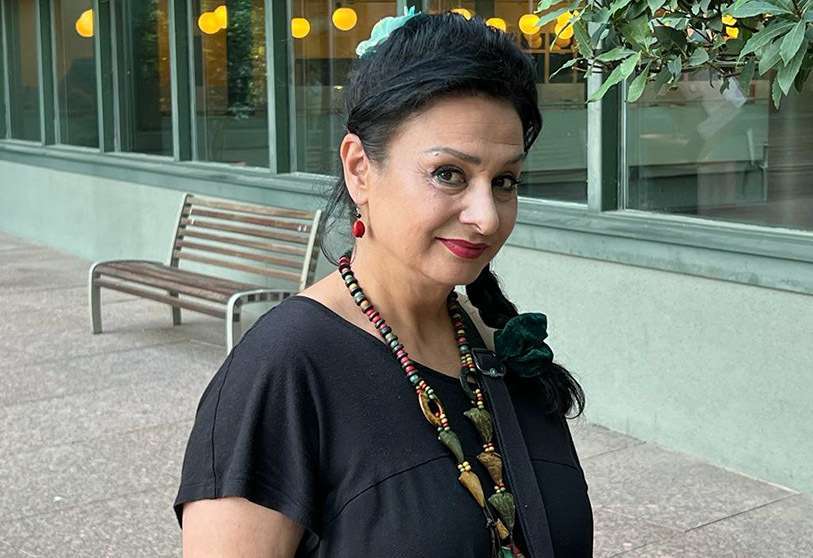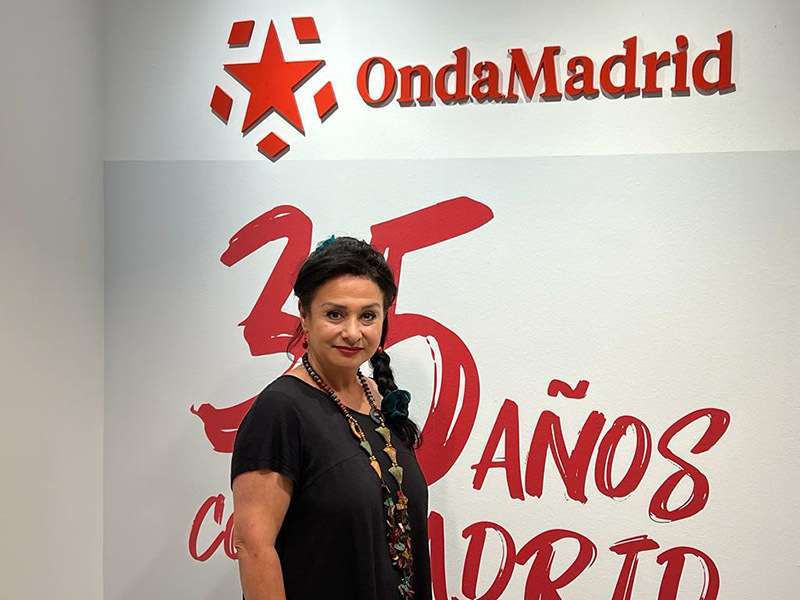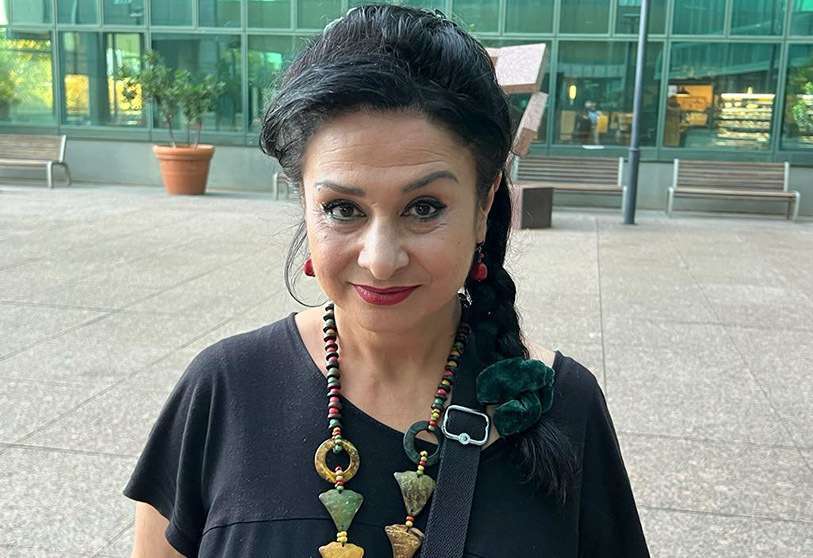Nilúfar Saberi: "We want the Iranian theocracy to stop ruling the country"

In the latest edition of "De cara al mundo", Atalayar's programme on Onda Madrid, we had the intervention of Nilúfar Saberi, Iranian activist, who spoke about the imminent fall of the Ayatollahs' regime after the protests in Iran over the death of Mahsa Amini, a theocratic dictatorship that seems to be hitting rock bottom after 43 years in power.
Could the protests over Mahsa Amini's death bring about the fall of the Ayatollahs' regime?
Without a doubt. The protests are no longer protests as such, it is a revolution. There have been a lot of protests over the last 43 years, but it has come of age to become a revolution where we are finally going to put an end to an Islamist theocracy. Our desire is to replace it with a democracy.
Nilufar Saberi is telling her story these days and we want to know who she is. You left Iran at the age of 14, why?
I am one more exile among the millions of Iranians who have had to leave our homes with the clothes on our backs. Those of us who have been able to leave with our families intact are lucky because so many of us were executed at the beginning of the Revolution.
We are talking about 1980, just after Khomeini came to power.
In my case, yes. I left Iran in 1980. My father was an artist, he was a magician, something unthinkable in Iran. This activity was banned in the country. To make matters worse, my father had performed at the Shah's parties, so he was nicknamed "the Shah's magician", and that was enough for him to be persecuted, he even saw the gallows and, under bribery of the guards, he was able to escape. When he got home he said: "We are leaving".
How did you get out of there?
Fortunately, we left by plane. We didn't have to cross mountains, as thousands and thousands of Iranians have done.
With your father's case, his life and the whole family's life was in danger, wasn't it?
Everything that is show business, art, singers, dancers, writers and everything that is normal for us here, in the Iran of the theocracy is considered to be Western decadence and against Islamic values. On the subject of the Shah, anyone who had anything to do with him, even if not in a political way with the Shah's regime, was persecuted at the time of the Revolution.

You arrived in Spain and how did you succeed?
It was terrible. You look back and you are impressed by the capacity of human beings to adapt to survive in difficult circumstances. We arrived without a language, without friends, with very little money, only the cash we had at home. First we stayed in a hotel, then we moved to apartment hotels, then to a shared room. We were my parents, my little sister and me.
From there, little by little, we contacted the United Nations, the Red Cross, they gave us a monthly amount that was not enough to rent a house, but we all started working, even with the little language. My father sold tobacco on the street, my mother looked after dependent people and cleaned houses, I looked after children, and with that we managed to rent a house in the Madrid neighbourhood of La Elipa. The neighbours helped us a lot. They were a big family. Apart from the material help, food, clothes, schools, there was the affection with which they embraced us. They came to our house to teach us how to play the guitar to take away the sadness that we had to shake off. Wonderful people. And I extend this to the rest of the people I have met throughout my 42 years of living in Spain.
And during these 42 years the situation in Iran has been getting worse.
It has got totally worse. Everything Khomeini promised from France was a carbon copy of what he was going to do when he came to power. He said he was a religious leader and that his place was in a mosque, and once he came to power he called himself supreme leader and absolutely everything is under his command directly or indirectly. All important positions in the country go through the election of the supreme leader. The media and the security forces are under his command. There is absolutely nothing that escapes the final decision of the supreme leader.
It is very important to clarify that Iran is not a republic, it is a theocracy, because the power is concentrated in one person and the elections are quite ridiculous. The supreme leader and his committee of experts choose who we can vote for. Not everybody can be a candidate in Iran for the presidency. He has to be male, he has to be a Shia Muslim, he has to have had nothing to do with the monarchy and other requirements. And of these people who meet all these requirements, they choose three or four people, they put them in front of us and we have to choose from there.
So what is said about "the moderate Rojani" or "the more extremist Ahmadinejad", is there much difference between the two or are they two puppets managed by the Revolutionary Council and the supreme leader?
Yes, there are differences between them, but ultimately it does not matter. The elected president in Iran has no day-to-day influence because everything goes through the supreme leader.
So the current president, Ebrahim Raisi, has no more power, right?
Not at all, and he doesn't even have a high school diploma, he has simply been put in place by the supreme leader.

Let's move on to the protests. At first there is the death of Mahsa Amini and the protests have been analysed not so much as political, but as a defence of the women's own way of life. However, has this evolved into a political question against the regime after more than 200 deaths in the repression?
I think absolutely everything is political, even the price of bread depends on politics. In Iran the protests have always been in defence of human rights, and among those rights is that of equality among human beings and, very specifically, non-discrimination on the basis of gender, something we have had in Iran from the very beginning with this Islamist regime.
Our self-identity has been taken away from us to the point that we don't even have the right to our own image; we have a compulsory dress code in Iran and at the beginning of the Revolution even allowed colours in which to dress. It is not that this has disappeared, they just reinforce the application of these laws when they feel like it. In Iran, discrimination against women is legislated, and we have nowhere to turn to in the face of this outrage. Right now in Iran, there is no demand for change or reform, because you can't ask for pears from the tree. In a theocratic, Islamist, radical regime, there is no room for reform. So what we want is for the Iranian theocracy to stop ruling Iran. This is the aim of the revolution at the moment.
Alongside the situation of women, there is the repression, the lack of freedom or the precariousness of life, which can be seen in the lack of electricity or the rationing of petrol, in a country that is the main producer of oil and has gas reserves, or in areas of the country that don't even have running water.
That's exactly right. In Iran right now, according to the ayatollahs themselves, 70% of the population lives below the poverty line. And that is unthinkable in such a rich country. In Iran, those who have anything to do with the Islamist authorities live well. The rest of the population has been impoverished at all levels, not only in terms of fundamental rights, but also to the point of having nothing to put in their mouths. The Islamist theocracy gives away national natural resources to other countries, such as China, Russia, Iraq, Oman, Palestine, Lebanon and Venezuela. Lebanon has rebuilt entire neighbourhoods, while Iran has yet to rebuild areas that were destroyed in the Iran-Iraq war, which began in 1982 and lasted eight years.
One of the regime's aims has always been to expand. There is Iran's support for Hamas in Gaza, for Hezbollah in Lebanon or in Syria. One of the issues, beyond the nuclear programme, is its willingness to expand and its support for violent groups.
Absolutely. The Iranian theocracy's support for Syria has done a lot of damage to its population. Millions have been invested in Syria. What the Islamists have always wanted is to expand Shia Islam at any cost. We Iranians are of no importance to them. Iran, as a country, is of no importance. The only thing that matters is to spread extremist Islamism, and that is very dangerous. It created and financed the terrorist organisation Hezbollah, which is the party of God. In Spain we have suffered Islamist terrorism in our own flesh as unfortunately in other parts of the world.
We must bear in mind that radical Islam was born in 1979 with the Iranian Islamist theocracy. The moment they disappear, the whole area will breathe. With Iran as a democracy, the whole area will flourish and we will experience a peace that we had lost for a long time, but I do not know to what extent the West is interested in peace and development in the Middle East.

We should be very interested, also right now with the Abraham Accords and the understanding between Arabs and Israelis, the agreement signed by Israel with the Emirates, with Bahrain, with Morocco and other Arab countries, and it is possible that Saudi Arabia will join in the near future. This changes this area which has been very convulsive and which, as you say, if the regime in Iran were to change, it would be a different matter.
Absolutely. I am convinced that it is in the interests of all of us ordinary people to have world peace. I am talking about political and economic interests, which do not always go hand in hand with the general interests of the people.
You are very convinced that this time the regime will fall, why? How can the people bring down the ayatollahs' regime?
There is no turning back in this revolution. The only thing that can be done to hasten its victory and lessen the bloodshed of the Iranian people is what we are counting on today, international support. This is the first time that the whole world is looking at Iran in a serious way. It is the first time that people have taken to the streets to shout with us "democracy for Iran", forcing their governments to take action against the Islamist government of Iran. It is the first time that this young generation has nothing to lose and would rather die than remain under the rule of Islamist radicals.
The authorities are running out of resources, they no longer have the money to keep paying mercenaries day and night to punish their own people, because in Iran itself there are so many people who refuse to kill their own people and they are exporting mercenaries they have been training in their terrorist groups.
It is the first time that this revolution has become a global feminist movement. I want to point out. We take up the origin of feminism which is nothing else than equality between all human beings, equality between women and men, complementarity between one and the other. In fact, in Iran, women and men take to the streets together and defend themselves together. In Iran we are more united than ever, we are many different ethnicities living together and sharing our culture. We are more united than ever because Mahsa Amini was a Kurd, and the Iranian government has always tried to divide us because of the Kurds' demand for independence, and right now the Iranian Kurd is the one who is being defended the most in the whole country. And this union among all ethnic Iranians, among Iranians outside the country and around the world, has no other possible end than the fall of the theocracy.








